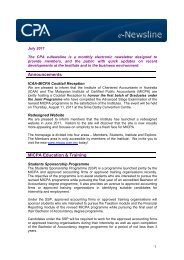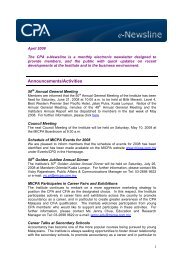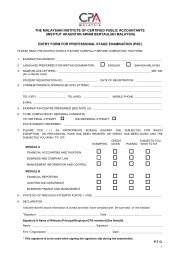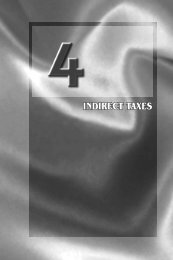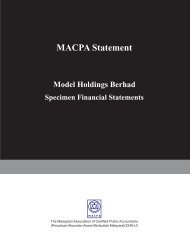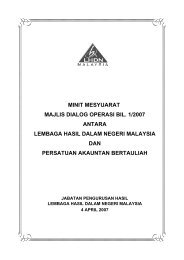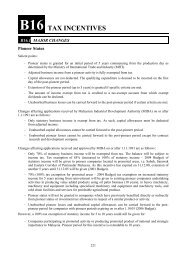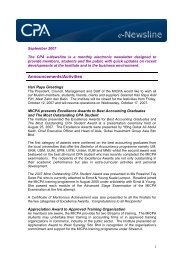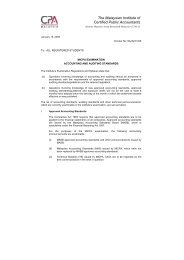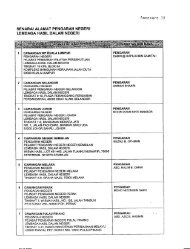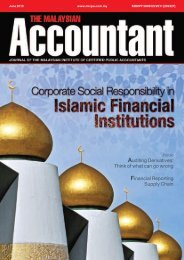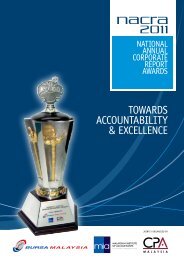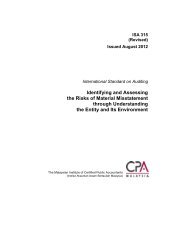The Malaysian Accountant - The Malaysian Institute Of Certified ...
The Malaysian Accountant - The Malaysian Institute Of Certified ...
The Malaysian Accountant - The Malaysian Institute Of Certified ...
Create successful ePaper yourself
Turn your PDF publications into a flip-book with our unique Google optimized e-Paper software.
any restrictions that may be in place. It does not affect anentity’s ability to get a refund. An employer’s ability to get arefund is determined by the statutory requirements in thejurisdiction in question and the scheme rules.An additional liability is recognised only if twoconditions exist at the same timeAn additional liability is recognised only if both of thefollowing conditions exist:• If the entity has a statutory or contractual obligation topay additional amounts to the plan and• If the entity’s ability to recover those amounts in thefuture by refund or otherwise is restricted.In that case, the recognition of an additional liability reflectsthe economic reality.<strong>The</strong> Interpretation clarifies when a surplus in a pensionplan can be recognisedIFRIC 14 provides a clearer interpretation of the availabilityof a surplus than the original standard, IAS 19 EmployeeBenefits. Under IAS 19 some have argued that a surplus isnot available to a plan sponsor unless it is immediatelyrealisable at the balance sheet date. IFRIC 14 states that theemployer only needs to have an unconditional right to usethe surplus at some point during the life of the plan or on itswind up in order for a surplus to be recognised.<strong>The</strong> Interpretation ensures that the accounting forsurpluses is consistent and transparent<strong>The</strong> Interpretation will ensure that any economic consequencesof making contributions required by legislation or the termsof the plan will be treated in a transparent and consistentmanner by all entities.* <strong>The</strong> IFRIC is the interpretative arm of the InternationalAccounting Standards Board (IASB).(Source: www.iasb.org)Convergence of accounting inemerging and transition economies<strong>The</strong> Symposium on International Convergence of Accountingin Emerging Markets and Transition Economies, jointlyhosted by International Accounting Standards Board (IASB)and China Accounting Standards Committee (CASC), washeld in Beijing on July 10-11, 2007. <strong>The</strong> participants presentat the Symposium (hereinafter referred to as “the participants”),which include representatives from the World Bank, theUNCTAD, EU?seventeen emerging markets, transition economiesand developed market economies, discussed strategies takenby emerging markets and transition economies to adopt orconverge with International Financial Reporting Standards(IFRSs) and the challenges encountered during the process.Building upon and strengthening cooperation with emergingmarkets and transition economies in the development,implementation and training of accounting standards willpromote emerging markets and transition economies toparticipate in international convergence and is beneficial toa single global high-quality set of financial reporting standardsto meet the objective needs of economic globalisation.<strong>The</strong> participants discussed the efforts made by emergingmarkets and transition economies in the internationalconvergence of accounting, and called for mutual understandingand common actions in the following aspects:1. Emerging markets and transition economies should buildup a clear concept about international convergence ofaccounting, and take active action to develop a plan onconvergence with IFRSs. <strong>The</strong> international convergence ofaccounting is the irreversible trend and direction ofdevelopment. <strong>The</strong> participants support internationalconvergence of accounting and the IASB in its efforts tobuild a global high-quality accounting standards system.<strong>The</strong> IASB encourages countries to participate in theinternational convergence process by developing a planto adopt the complete set of IFRSs. However, the IASBrecognises that there are specific conditions in eachjurisdiction. Convergence is a process and should be atwo-way interaction between national accountingstandards setters and the IASB. <strong>The</strong> participants sharedexperiences on the international convergence of accountingin their own countries at the Symposium, and took notethat China’s developments of accounting standards andits achievements towards international convergence haveaccumulated valuable and significant experience foremerging markets and transition economies.2. <strong>The</strong> IASB should continue to create a favourable environmentfor emerging markets and transition economies to participatein the development of IFRSs thus achieve the internationalconvergence of accounting. <strong>The</strong> International AccountingStandards Committee Foundation (IASCF) Constitutioncharges the IASB to consider the needs of emerging marketsand transition economies in its standard-setting and otheractivities. Accordingly, opinions from different parties,including emerging markets and transition economies,and their actual situations need to be taken into sufficientconsiderations during the standard-setting of the IASB.<strong>The</strong> IASB participates in several outreach activities,including sponsoring regional meetings, at which it seeksto learn the views of its constituents. Emerging markets andtransition economies are also represented on the IASCFTrustees and Standards Advisory Council (SAC). Emergingmarkets and transition economies are important participantsin the global capital market and users of IFRSs, thus theywill play an important role in IFRSs setting. <strong>The</strong>refore, theparticipants proposed to set up a Forum on International48 | <strong>The</strong> <strong>Malaysian</strong> <strong>Accountant</strong> | June/August 2007 www.micpa.com.my



